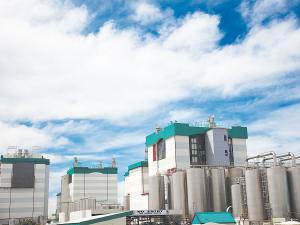Fonterra’s exit from Australia ‘a major event’
Fonterra’s impending exit from the Australian dairy industry is a major event but the story doesn’t change too much for farmers.
 Fonterra’s new electrode boiler at Edendale site will reduce emissions by around 20% or 47,500 tonnes of carbon dioxide equivalent per annum.
Fonterra’s new electrode boiler at Edendale site will reduce emissions by around 20% or 47,500 tonnes of carbon dioxide equivalent per annum.
Fonterra is installing a $36 million 20-megawatt electrode boiler at its Edendale site in Southland, as the co-op moves away from coal.
The electrode boiler will reduce the Edendale site's emissions by around 20% or 47,500 tonnes of carbon dioxide equivalent per annum - the equivalent of taking almost 20,000 cars off NZ roads.
It will also help reduce Fonterra's overall carbon emissions from its NZ 2018 baseline by nearly 3% per annum once operational in 2025-26.
Fonterra says the investment is another step for the co-operative as it works to get out of coal by 2037 and reduce Scope 1 and 2 emissions by 50% by 2030 (from 2018 baseline).
Fonterra acting chief operating officer Anna Palairet says the team considered a number of energy options before deciding on the electrode boiler.
"Fonterra has a complex manufacturing operation spanning the country.
"As technologies develop, it's important we continually assess which energy source and technology is best for each site.
"With up to 15 million litres of milk being processed at our Edendale site each day, we need to ensure we have a secure energy supply that can meet processing demands."
Cost is also an important consideration.
Palairet says getting out of coal requires significant investment and the co-op needs to choose the best option that reduces emissions and operational complexity while also doing what's best for farmer shareholders.
Fonterra is partnering with Meridian Energy for the electricity supply who generate electricity from 100% renewable resources - wind, water, and sun.
Fonterra’s impending exit from the Australian dairy industry is a major event but the story doesn’t change too much for farmers.
Expect greater collaboration between Massey University’s school of Agriculture and Environment and Ireland’s leading agriculture university, the University College of Dublin (UCD), in the future.
A partnership between Torere Macadamias Ltd and the Riddet Institute aims to unlock value from macadamia nuts while growing the next generation of Māori agribusiness researchers.
A new partnership between Dairy Women’s Network (DWN) and NZAgbiz aims to make evidence-based calf rearing practices accessible to all farm teams.
Despite some trying circumstances recently, the cherry season looks set to emerge on top of things.
Changed logos on shirts otherwise it will be business as usual when Fonterra’s consumer and related businesses are expected to change hands next month.

OPINION: Here w go: the election date is set for November 7 and the politicians are out of the gate…
OPINION: ECan data was released a few days ago showing Canterbury farmers have made “giant strides on environmental performance”.